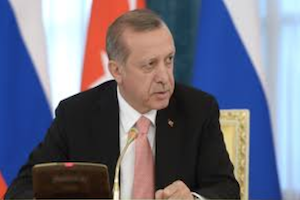Turkey Advances in Africa against Franco-Emirati-Egyptian Entente
By Michaël Tanchum
August 25, 2020
Turkey's expanded military presence in Libya has tilted the geopolitical game-board more in Ankara's favor vis-à-vis France and Egypt and their partner the United Arab Emirates. While motivating the strong backing Paris and Cairo are providing to Greece as it confronts Turkey in the eastern Mediterranean, Ankara's effort to extend Turkey's influence throughout Africa is driving a wider strategic competition between Turkey and France in the Sahel and likewise between Turkey and Egypt in the Horn of Africa. Ankara's advances in Niger in the Sahel and in Ethiopia in the Horn have raised the stakes for Turkey's rivals, pushing them into closer alignment, with the rivalry between Turkey and the Franco-Emirati-Egyptian entente defining one of Africa's main geopolitical fault lines.
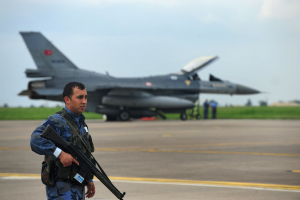
The EU and De-escalation in the Eastern Mediterranean
By Natalia Konarzewska
June 29, 2020
The discovery of new gas reserves in the region was expected to bring peace and prosperity to the Eastern Mediterranean littoral states but it has created new geopolitical and security risks instead. In April and May this year, Turkey continued with gas drilling within Cyprus' exclusive economic zone which drew new harsh criticism from the European Union. Turkey's assertive stance shows that Ankara is unlikely to abandon its pursuit for hydrocarbons in the region and that it will hence remain on a collision course with Greece and Cyprus. The EU would do well to seek de-escalation and should recognize that circumventing Turkey is not a viable strategy. Otherwise, there is a clear risk that the hydrocarbon dispute in the region will spiral out of control and lead to military confrontation.
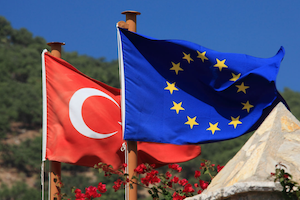
Turkey's Libyan Intervention Heightens Franco-Turkish Systemic Rivalry
By Michaël Tanchum
June 23, 2020
On June 18, 2020, NATO Secretary-General Jens Stoltenberg announced the alliance is opening an investigation prompted by France's allegation that one of its naval frigates was targeted for attack by a Turkish naval warship in the Mediterranean as the frigate sought to interdict a civilian Turkish vessel suspected of transporting weapons to Libya. Although Turkey denies the allegation, the incident represents a new escalation in the rising tensions between Turkey and France already inflamed by France's increasing naval cooperation with Cyprus. Following the recent success of Turkey's military intervention to preserve Libya's Government of National Accord, Ankara reportedly plans to establish an air base and a naval base in the country. Reorienting the strategic architecture of the region more in Turkey's favor, the two Libyan bases will greatly boost Turkey's engagement with the nations of North Africa and the Sahel. Facing a potential loss of influence in Africa, France may choose to align more deeply with Turkey's rivals in Libya.
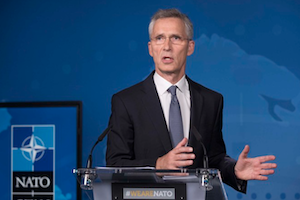
Süleyman Soylu: The Rise of the "Second Man" of the Turkish Regime
By Gonca Tokyol
June 8, 2020
Turkey’s Interior minister Süleyman Soylu has widely come to be seen as the “Second man” of the Turkish regime, and has recently strengthened his position. The fiercely nationalistic Soylu boasts broad popularity among the supporters of both the ruling Justice and Development Party (AKP) and its partner, the Nationalist Movement Party (MHP). The future of a post-Erdoğan AKP is going to be decided by how the rivalry between Soylu and the not-so popular finance minister Berat Albayrak, President Recep Tayyip Erdoğan's son-in-law, plays out. Increasing popular, Soylu has also become a target. Yet the combination of his center-right roots, his adoption of the Islamic conservative AKP and the endorsement of the right-wing nationalist MHP means that Soylu can lay claim to all three ideological traditions of which the right in Turkey is composed. That makes Soylu a strong pretender not only to the leadership of the right, but also of Turkey.
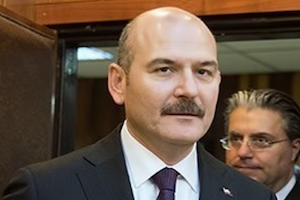
COVID-19 and the Turkish Economy: Erdoğan Faces His Toughest Challenge
By Barış Soydan
May 11, 2020
Will the Turkish economy survive the Covid-19 pandemic? If the emergency measures remain in place for more than a few months – which they likely will, given that the pandemic is expected to last for at least a year, if not longer – what looms is a cumulative loss of economic output compared to which the 2001 financial crisis that blew up Turkish economy pales. A big slump, with bankruptcies, mass unemployment and government debt running at record highs loom on the horizon. The economic consequences of covid-19 are going to present Recep Tayyip Erdoğan with the toughest challenge that he has had to face during his seventeen years in power.
